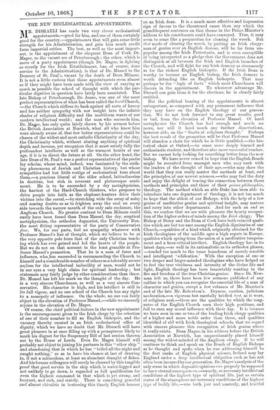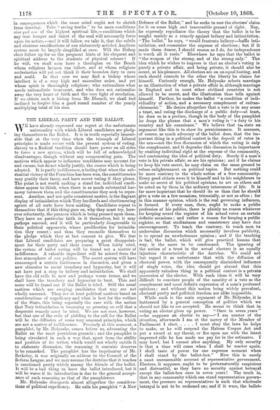THE NEW ECCLESIASTICAL APPOINTMENTS.
ly1R. DISRAELI has made two very clever ecclesiastical appointments,—good for him, and one of them certainly good for the country,—appointments that will gain some little -strength for his Administration, and gain him much credit from impartial critics. The best, as well as the most import- -ant, is the appointment of the eloquent Dean of Cork, Dr. .Magee, to the vacant see of Peterborough ; the other, which is more of a party appointment (though Dr. Magee, in fighting so stoutly for the Irish Establishment, has, of course, done service to the Administration), is that of Dr. Mansel to the Deanery of St. Paul's, vacant by the death of Dean Milman. It is not a little curious that these appointments seem almost -as if they might have been made with the view of varying as much as possible the school of thought with which the par- ticular dignities in question have lately been associated. The late Bishop of Peterborough, Dr. Jeune, was one of the most perfect representatives of what has been called the hard Church, —the Church which stiffens its back against all sorts of heresy and has neither sympathy with nor insight into the infinite .shades of religious difficulty and the multiform wants of our modern intellectual world ; and the man who succeeds him, Dr. Mag,ee, has only quite lately shown by his sermon before the British Association at Norwich, what all who knew him were already aware of, that few better representatives could be -chosen of the widest and most catholic Christianity of the day, the Christianity which, without abating anything of spiritual depth and fervour, yet recognizes that it must satisfy fully the profoundest intellects as well as the warmest hearts of our age, if it is to direct the future at all. On the other hand, the late Dean of St. Paul's was a perfect representative of the poetic lay scholar, whose mind, indeed, was fascinated by the strik- ing phenomena of Jewish and Christian history, but whose sympathies had but little vestige of ecclesiastical tone about them,—a gracious liberal of the older school, latitudinarian in doctrine, but rich in reverent and picturesque senti- ment. He is to be succeeded by a dry metaphysician, the hardest of the Hard-Church thinkers, who proposes to drive people into faith as the elephant-hunters drive their victims into the corral,—by stretching wide the array of noisy and scaring doubts so as to frighten away the soul on every side towards the narrow mouth of the only safe enclosure, the Anglican Church. No greater contrast to Dean Milman could .easily have been found than Dean Mansel, the dry, sceptical metaphysician, the orthodox dogmatist, the University Don, the most fitting representative of the party of Conservative fear. We, for our parts, feel no sympathy whatever with Professor Mansel's line of thought, which we believe to be at the very opposite pole from that of the only Christian teach- ing which has ever gained and led the hearts of the people. But we do not on that account in the least grumble at Pro- fessor Mansel's promotion. That he is a man of force and influence, who has succeeded in recommending the Church to himself and a considerable number of others as a tolerably secure asylum for the intellectual imbecility of man, would not be in our eyes a very high claim for spiritual leadership ; but statesmen may fairly judge by other considerations than these. Dr. Mansel has left his mark on the thought of the day. He is a very sincere Churchman, as well as a very sincere Con- servative. His character is high, and his intellect is still in its full vigour, and no one school of the Church has any right to a monopoly of influence. On the whole, no one can fairly .object to the elevation of Professor Mansel,—while we sincerely rejoice in the elevation of Dr. Magee.
Of course, the chief political feature in the new appointment is the encouragement given to the Irish clergy by the selection ,of one of their number to fill an English bishopric, and the vacancy thereby created in an Irish ecclesiastical office of -dignity, which we have no doubt that Mr. Disraeli will have great pleasure in at once filling up with a promptness likely to mark his disgust for the Suspensory Bill of last session thrown out by the House of Lords. Even Dr. Magee himself will probably not object to joining his partners in this "other ship" .and abandoning that in which he has "toiled all the night and .caught nothing," so as to have his chance at last of drawing in, if not a miraculous, at least an abundant draught of fishes. And his former colleagues will surely be cheered by this tangible proof that good service in the ship which is water-logged and not unlikely to go down, is regarded as full qualification for even the highest command in that which is yet strong, and ; buoyant, and rich, and stately. There is something graceful and almost chivalric in bestowing this timely English honour on an Irish dean. It is a much more effective and impressive sign of favour to the threatened cause than any which the grandiloquent sentences on that theme in the Prime Minister's address to his constituents could have conveyed. True, it may seem to some like a preparation for clearing the wreck. But that mode of clearing the wreck, by putting an Irish clergy- man of genius over an English diocese, will be far from un- popular among the Irish Protestants, and is even susceptible of being interpreted as a pledge that the Government does not distinguish at all between the Irish and English branches of the Church, and will fight for any Irish deanery as strenuously as for the richest English bishopric. If the Irish Dean is worthy to become an English bishop, the Irish deanery is worth defending like an English bishopric. That may perhaps be the "logic of facts" which most Churchmen will discern in the appointment. To whatever advantage Mr. Disraeli can gain from it for the elections, he is clearly fairly entitled.
But the political bearing of the appointments is almost unimportant, as compared with any permanent influence that they may have on the English theology of our genera- tion. We do not look forward to any great results, good or bad, from the elevation of Professor Mansel. Of hard metaphysics the Church has had enough and needs no more, nor will it heed much any further dissertations, however able, on the "limits of religious thought." Perhaps the best result of the promotion will be that Professor Mansel will abandon a chair for which he is little qualified,—the his- torical chair at Oxford,—to some more deeply learned and enthusiastic student, and therefore also more successful teacher. But we cannot help looking for something better from the new bishop. We have never ceased to hope that the English Bench might be recruited from amongst men who may rank with the leaders of the thought of their age,—who may show the world that they can really master the methods at least, and the principles, of our newest sciences,—who may feel the duty and enjoy the delight of tracing the connection between those methods and principles and those of their prima philosophia, theology. The method which an able Duke has been able to introduce into one department of theology, it is not too much to hope that the ablest of our Bishops, with the help of a few grains of meditative genius and spiritual insight, may mature and carry into other departments. And for such an end as this, we confess that we see with pleasure the hearty recogni- tion of the higher orders of minds among the Irish clergy. The Bishop of Derry and the Dean of Cork have both evinced quali- ties which are but too rare among the English dignitaries of our Church,—qualities of a kind which originally obtained for the Irish theologians of the middle ages a high repute in Europe, qualities which spring from the union of a meditative tempera- ment and a keen critical intellect. English theology has in its latest days,—as well in its rationalistic as its orthodox phases, —tended too much to the tame humdrum of merely sensible and intelligent edification.' With the exception of one or two deeper and larger-minded theologians who have helped us to feel the true vividness and intensity of the divine life and light, English theology has been lamentably wanting in the fire and freedom of the true Christian genius. Since Dr. New- man left us, there have been few sermons published of any calibre in which you can recognize the essential life of a man of character and genius, except a few volumes of Mr. Maurice's and of the late Mr. Robertson's. Dryness, caution, judicious moderation,—a vigorous but carefully bridled trot, as it were, of religious zeal,—these are the qualities by which the mag- nates of the English Church earn their high positions, and fail to earn any moral influence with their day. It is because we have seen in one or two of the leading Irish clergy qualities of a higher and more noble order than these, and qualities identified of old with Irish theological schools, that we regard with sincere pleasure this recognition of Irish genius where it really exists. Dean Magee, in his address before the British Association at Norwich, has unquestionably placed himself among the widest-minded of the Anglican clergy. If lie will continue to think and speak on the Bench of English Bishops as he thought and spoke when he was addressing himself to the first ranks of English physical science, Ireland may lay England under a deep intellectual obligation such as has not often been incurred by our generation. Dr. Magee's analysis of the only sense in which dogmatic opinions can properly be supposed to have eternal consequences,—namely, as necessary intellectual conditions of the highest type of spiritual life, just as certain states of the atmosphere are necessary conditions of the highest type of bodily life,—was both just and masterly, and fruitful in consequences which the same mind ought not to shrink from drawing. Take "saving truths" to be mere conditions sine quit non of the highest spiritual life,—conditions which any true hunger and thirst of the soul will necessarily force upon its notice,—and it will follow, we take it, that the subtle and abstruse ramifications of our elaborately articled Anglican system must be largely simplified at once. Will the Bishop elect follow up for us the pregnant hints of his eloquent and spiritual address to the students of physical science ? If he will, we shall soon have a theologian on the Bench whom religions laymen can follow, and at whom religious ecclesiastics will yet not think it their bounden duty to rave and scold. In that case we may find a bishop whose intellect is of a very high and masculine order, and yet whose spirit is thoroughly religious ; who rationalizes what needs rationalistic treatment, and who does not rationalize away the very heart of faith and the very light of revelation. If we obtain such a bishop from Mr. Disraeli, we shall feel inclined to forgive him a good round number of the yearly multiplying total of his sins.



































 Previous page
Previous page